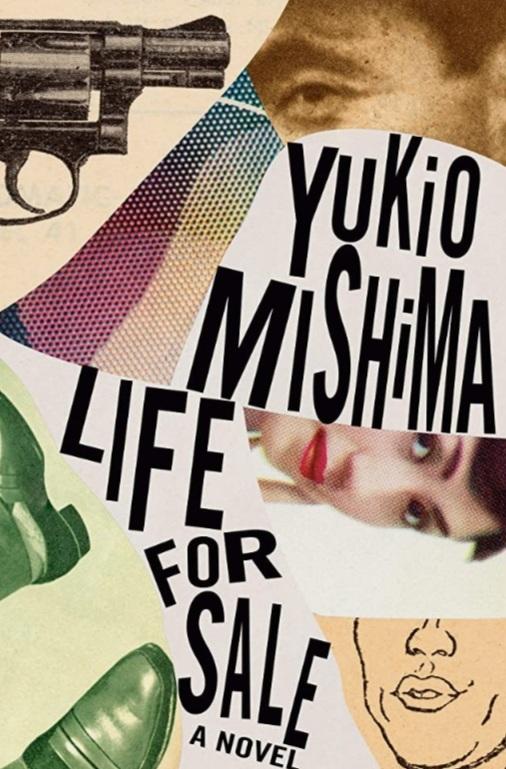Absurdity Reigns In Yukio Mishima's Dark Comedy Novel 'Life For Sale'
FTC Statement: Reviewers are frequently provided by the publisher/production company with a copy of the material being reviewed.The opinions published are solely those of the respective reviewers and may not reflect the opinions of CriticalBlast.com or its management.
As an Amazon Associate, we earn from qualifying purchases. (This is a legal requirement, as apparently some sites advertise for Amazon for free. Yes, that's sarcasm.)

Imagine, if you will, this hypothetical scenario: Stephen King, pre-eminant author of the United States, one day decides to storm an army base with a group of friends, intending to spark an insurrection against the government through a broadcast reading of his stories before committing grisly suicide. Sound implausible? Preposterous? Perhaps. But that’s exactly the bizarre situation the Japanese public awoke to on November 25, 1970, when Yukio Mishima, then that nation’s foremost literary icon, led four members of a right-wing militia into a central Tokyo military installation, took its commandant hostage, and tried to inspire the country’s Self-Defense Forces to overthrow the post-war regime he’d so long held in contempt. When the coup d’etat inevitably failed, Mishima and one of his followers both performed seppuku—the ritual suicide of the samurai—to the shock of the entire world.
Born in 1925, Mishima, a top-tier celebrity, playwright, poet, actor and model who rose to prominence with the publication of his 1949 novel Confessions of a Mask, had already courted controversy for his criticism the changes Western-style industrialism had wrought on traditional Japanese culture, an ideological struggle he explored in a body of work that included thirty-four novels, fifty plays, twenty-five volumes of short fiction, thirty-five books of essays and one screenplay. Using a combination of historical settings, razor-sharp satire, vivid violence and brooding eroticism, Mishima’s fictional worlds pulsed with the uncompromising fatalism of what he saw as a dying way of life.
Previously unavailable in the West, Mishima’s dark farce Life For Sale was originally published as Inochi Urimasu in 1968 after being serialized in a Japanese magazine, and only released in 2020 through an English edition translated by Stephen Dodd via Vintage International, a division of Penguin Random House. Unlike many of Mishima’s tales, Life For Sale is firmly set in the period in which it was written, a time of intense upheaval even in conservative Japan. The influence of the then-relevant American hippie (and concurrent English Angry Young Man) movement—and the reaction against it—play an integral part in the story’s backdrop, as does the swingin’ ‘60’s spy subgenre.
In the midst of such shifting societal unrest is twenty-seven-year-old Hanio Yamada, an unhappy, unmarried worker drone at a Tokyo ad agency who, at novel’s onset, has just been rescued from a botched subway suicide attempt. Convalescing afterwards, Hanio is disappointed by his failure, but reasons that since the modern world has rendered human existence meaningless, he will instead fulfill his death wish by literally selling his life to the highest bidder. To that end, he places a classified ad in the newspaper, thus beginning a black comedy of errors, as a series of prospective buyers arrive on Hanio’s doorstep, offering increasingly absurd amounts of cash and throwing him into progressively more lethal situations.
The first client is an old man who wants to indirectly kill his ex-wife, hoping her current lover, a ruthless yakuza boss, will catch her coitus interruptus with Hanio and murder them both. When Hanio not only escapes but unwittingly succeeds in his mission, he’s ever-more determined to die, and accepts a woman’s offer to be fatally drugged by a trio of dodgy American scientists, a CIA operative’s invitation to sneak into the embassy of his Cold War rival’s embassy, and the sanguine romantic overtures from a suburban vampire. As the novel nears its conclusion, however, Hanio becomes suspicious, thinking that these seemingly random events may in fact be the machinations of an oft-referenced clandestine organization called the Asia Confidential Service (ACS). Going on the run, he flees from one town to another, fearful that shadowy assassins are targeting the life he now doesn’t want to lose.
Life For Sale is nothing if not entertaining. It’s a quick, quirky read, filled with ever-more offbeat scenarios, tongue-in-cheek dialogue and a bleak gallows humor that comes off as one part screwball caricature, one part paranoiac’s fever dream and one part madcap crime caper. At the novel’s core is an inescapable irony upon which Mishima hangs the tale—through his continuing efforts to die, Hanio learns to value the life he previously wanted to end—but there’s more beneath the surface than simple satire. Themes revolving around mistrust of authority, the perils of an impersonal society and the passing of a long-standing era into an uncertain future are more relevant today than in 1968. Our technological age, Mishima asserts, has bestowed wonders beyond the imagining of our primitive ancestors, but at the cost of a sacrificed heritage. Knowing Mishima’s ultimate fate, too, adds a pervasive sense of doom to Hanio’s self-inflicted plight; the author’s suicide—itself equal measure performance art, public spectacle and spiteful reproach—lends weight to the ruminations about life, death and the search for fulfillment that serve as solemn mortar fastening the book’s comedic bricks.
Outlandish and over-the-top, Mishima’s elegant prose and singular worldview balances a heady zaniness with earnest zeal unafraid to explore the lonely quarters of the human heart, and it’s for that reason that I’m compelled to grant Life For Sale the full 5 (out of 5) on my Fang Scale. Don’t forget your carrot sticks! (Read the book. You’ll understand what I mean.)


